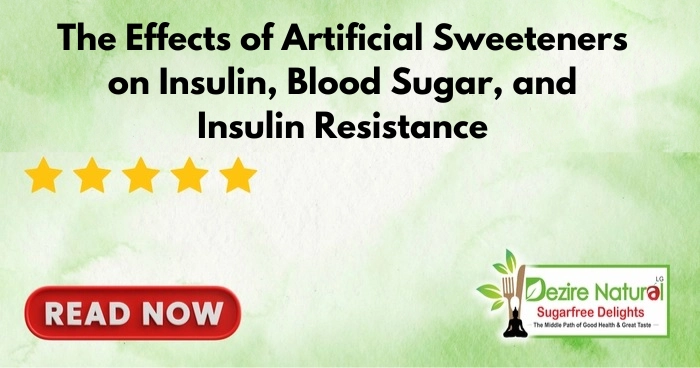In a nutshell, sugar is worse than sweeteners. Stated differently, diet soda is more healthful than regular soda. Artificial sweeteners, however, are unhealthy. Although eating too much sugar increases your risk of insulin resistance and diabetes, consuming too much sweetener may also increase your risk, according to current research. Insulin resistance, also referred to as pre-diabetes, increases the risk of heart attacks, strokes, and vision impairment. But not all artificial sweeteners are made equal—some are healthier than others.
A brief introduction to insulin resistance
Let's begin with the fundamentals: what causes insulin resistance and the reasons it is an issue. Our bodies create insulin in response to sugar consumption, which is necessary for the breakdown of carbohydrates like glucose and sucrose. Insulin receptors are found on cells, ensuring that our cells receive the proper quantity of glucose.
The issue is that frequent high insulin spikes occur when we ingest large quantities of sugar. The insulin surges eventually lead to the deterioration and dysfunction of our insulin receptors. When this occurs, our blood becomes too sugared because our cells are unable to absorb the necessary amounts of sugar. Numerous issues arise throughout the body as a result of this.
Are insulin levels increased by artificial sweeteners?
The good news is that artificial sweeteners are not interpreted by the body as sugar. This is because they aren't made of sugar. Rather, they are substances that attach to the parts of our taste receptors that detect sweetness. In principle, eating artificial sweeteners shouldn't cause our bodies to release insulin. Aspartame does not directly increase insulin levels, according to research. (I'll get to aspartame's other issues later.)
There's growing evidence that some sweeteners appear to have an impact on metabolism. According to a recent study, taking sucralose—found in the popular brand Splenda—ten minutes before glucose boosts the body's reaction to insulin. Additionally, dextrose, a minor calorie sweetener found in Splenda and other brand-name sweeteners, may slightly increase insulin response.
There is a lack of research on the impact of sweeteners on the body's insulin response, particularly over extended periods. A recent study on patients with Type II diabetes discovered that the individuals who used artificial sweeteners—the study did not specify which kinds—had a higher degree of insulin resistance than the individuals who did not use them. That is to say, their bodies weren't as capable of breaking down glucose.
The results of this study do not necessarily imply that artificial sweeteners are to blame; it's likely that people who used more of them also ate more sugar. However, there is rising study on the impact of sweeteners like aspartame and Splenda on insulin, so this is an area to watch.
Can other health issues be brought on by artificial sweeteners?
Artificial sweeteners may result in additional issues even though they don't produce the same extreme insulin spikes that sugar does. Research suggests that gut flora may be a major factor in the emergence of insulin resistance and diabetes. Research indicates that there are variations in the gut microbiota between individuals without Type 2 diabetes and those who do.
Do sweeteners alter our gut flora in a negative way? That's quite possible. Research indicates that mice with large sugar intakes have noticeable alterations in their gut flora, specifically an increase in "bad bacteria" and a decrease in "good bacteria." The mice start to show symptoms of insulin resistance when these alterations in gut flora take place. This has been shown with aspartame, saccharin, and sucralose. In mice linked to fat, acesulfame K has changed the microbiota.
One of the safest sweeteners, stevia, has also come under scrutiny after a December study revealed it may alter the way bacteria communicate in the stomach. But stevia doesn't appear to kill germs, and it's unclear whether or not its effect on bacterial communication leads to issues.
Mice are not people, therefore we should interpret these findings cautiously. Additionally, it's unclear whether and to what extent sweets impact human gut microbes similarly to how they do mice. Studies on humans and mice have also shown that nutrition has a big impact on gut flora, with diets high in junk food leading to an increase in harmful gut flora.
Nobody is certain how gut bacteria might affect insulin resistance and diabetes. Some people speculate that harmful bacteria in our stomachs may communicate with our brains to cause a hunger for sweets. Once more, this is a place to be cautious.
In summary, it's critical to reduce consumption of both sugar and artificial sweeteners.
There is growing evidence that certain artificial sweeteners may trigger an insulin reaction and may have detrimental effects on our gut flora; however, the consequences vary based on the kind of sweetener.
Having said that, we are certain that consuming large quantities of real sugars results in the development of insulin resistance, diabetes, obesity, heart disease, and other chronic health issues. Juices, drinks, and sweets must be avoided as much as possible by people. Additionally, it is recommended to opt for a low-carb diet in general. For those who already have diabetes and/or insulin resistance, this is obviously even more crucial.
However, if you're hooked to sweets, you probably occasionally give in to a craving. In this instance, selecting drinks and candies containing artificial sweeteners instead of sugar is preferable. It's crucial to keep in mind that while a sudden increase in insulin is unavoidable from sugary drinks, occasional diet cokes won't destroy your good bacteria or lead to insulin resistance. Though not much research has been done on them, erythritol and stevia are currently thought to have the safest profiles because they are both relatively new sweeteners.

